Lagos, Nigeria’s commercial capital, has announced plans to invite bids for the construction of gas-fired power plants with a total capacity of up to 4,000 megawatts (MW) to help bridge the national grid’s electricity shortfall. The initiative aims to end years of blackouts that have affected both businesses and households in the rapidly growing metropolis.
According to the World Bank, 40% of Nigerians lack access to electricity, which has been a significant barrier for investment in the country. Lagos, home to over 20 million residents, needs 6,000 MW of electricity but currently receives just 2,000 MW from the national grid.
As part of its Clean Lagos Electricity Market plan, the Lagos state government has allocated four hubs for the construction of power stations. The Ministry of Energy and Mineral Resources confirmed that each hub will require a minimum of 500 MW of generating capacity, which will be provided by one or more power companies selected through the bidding process.
The chosen companies will need to secure their own financing through power purchase agreements with the state. This initiative follows a move by President Bola to allow state governments to generate and distribute their own power, reversing a previous law that gave the federal government exclusive control over power distribution.
While low electricity tariffs have previously deterred private investment, the government has begun removing subsidies to stimulate more investment in the sector. Nigeria has the infrastructure to generate 13,000 MW of electricity, but its aging grid can only distribute a third of that, forcing businesses and households to rely on costly fuel generators. The country recently experienced its ninth grid collapse of the year.
Credit: Reuters (Text Excluding Headline)






















